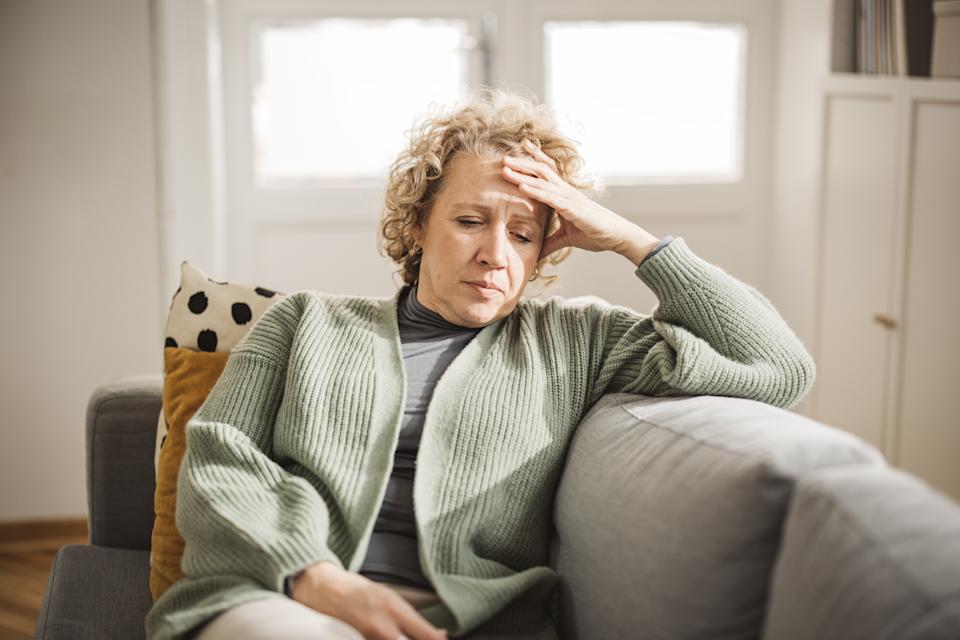Zoe Ball kept the nation entertained for three hours each weekday morning while hosting BBC Radio 2’s Breakfast Show, but the 54-year-old DJ has revealed that she struggles with a very familiar fear: “really bad” social anxiety.
Chatting with Jo Whiley on the debut episode of their new podcast, Dig It, Ball admitted that when an event is approaching, she often finds herself looking for reasons not to go.
“You talking about it being tricky to go to parties. I have really bad social anxiety. My brother has it too,” she shared. “And so whenever there’s an event coming up, be it Glastonbury or a wedding or a party, I’m always slightly in the back of my head trying to think of an excuse for not being able to go.”
Ball said she relies on certain strategies to manage her anxiety: “You don’t want to reach for a drink, because then it just makes it worse. So it’s about breathing through it and finding someone you know you can chat to, because I’m really bad at small talk.”
Whiley empathised with Ball’s experience, noting that social anxiety can intensify with age, particularly during the menopause. “That’s what we’ve come to realise,” said the 60-year-old DJ. “I’ve got girlfriends who are a similar age, and I think they’re going through the menopause. That’s when you start to feel quite vulnerable – you don’t have the same confidence you had when you were younger.
“Quite often, you don’t have a group of girls or a partner around you, so you’re coming on your own, and that’s tough.”

Ball and Whiley are now hosting the new podcast, Dig It, together. (Persephonica)
How to overcome social anxiety
Social anxiety is very normal. In fact, data from the British Association for Counselling and Psychotherapy (BACP) shows that more than 54% of us experience it.
Counsellor Georgina Sturmer assures us that there are many simple strategies that can help.
Distract yourself
“When we are feeling anxious, finding a distraction is a great way to remove our emotional threat level. This might involve helping out at a party, or keeping busy with something,” Sturmer shares.
It’s a strategy that resonates with Ball, who says she often feels more comfortable when she has a role to focus on.
“I quite like it if I turn up at something and people will be like, ‘Can you just keep an eye on the little ones?’ I’m like, ‘Yep, great. I’ll go look after the little kids,’ because then I don’t have to talk to adults,” she said. “Let me go and sort the ice out, let me lay out the salads, give me something to do.”
Look for someone safe
Ball says she often looks for a familiar face at a party to avoid small talk, another strategy the counsellor recommends.
“Consider the people, places or objects that represent calmness or safety. Will they be available during the event or outing? If not, can you reach them by phone or carry an object with you that reminds you of their presence?” Sturmer asks.

A counsellor spoke to Yahoo UK about the practical ways to manage social anxiety. (Getty Images)
Catch the catastrophe
“Think through the situation and map out the underlying fears that are causing your catastrophe,” Sturmer suggests. She recommends identifying these thoughts and fears and challenging how rational they truly are.
Avoid triggers like alcohol
During the podcast, Ball shared that she avoids alcohol in social situations, as it can amplify her anxiety. She’s previously spoken about her past struggles with alcohol, revealing that it often stemmed from feelings of shyness.
Sturmer recommends that people avoid all triggers in social situations: “This will be different for all of us. It might be caffeine, alcohol, doomscrolling, or even certain people. Managing these triggers can help you to retain a feeling of control.”
Figure out your coping mechanisms
Sturmer explains that it is important to have coping strategies, which are most helpful when we integrate them into daily life, not just when we are feeling anxious.
“So it might be helpful to start thinking about breathing and grounding practices,” she says. “I highly recommend five finger breathing so that you develop ways to regulate yourself before anxiety strikes.”

Ball says she often looks for a familiar face at a party as this eases her social anxiety. (Getty Images)
What causes social anxiety?
“When we talk about social anxiety, we are referring to a set of fears and worries that can leave us feeling anxious when we are socialising or thinking about socialising,” Sturmer says, adding that there are a variety of possible causes for social anxiety.
“It might be a strong inner critic – telling us that we are not good enough – that intensifies when we think about seeing other people,” Sturmer explains. “It might be related to a feeling of sensory overload that accompanies the idea of being out and about.”
Long-term impact of the pandemic
Sturmer says some people’s social anxiety could also be linked with the legacy of COVID, “when we were all told that the world was an unsafe place.”
This chimes with the previously mentioned BACP research, conducted in March. It showed:
-
Over one in three (39%) were happier during lockdown when they didn’t have to socially interact with others
-
Around one in three (31%) feel more anxious in social situations since the pandemic, with this rising to 47% in young people (aged 16 to 24)
-
32% believe the pandemic has negatively impacted their social skills and ability to communicate
Is CBT helpful?
According to Sturmer, cognitive behavioural therapy (CBT) is helpful if you’re happy to delve deep into your negative thought patterns.
She says: “Therapy can be helpful for social anxiety, and different modalities – or therapeutic approaches – will work in different ways. CBT will focus on the negative thought patterns behind the anxiety, while psychodynamic or integrative approaches might dig into the root causes of the anxiety in different ways.”
Read more about anxiety:
